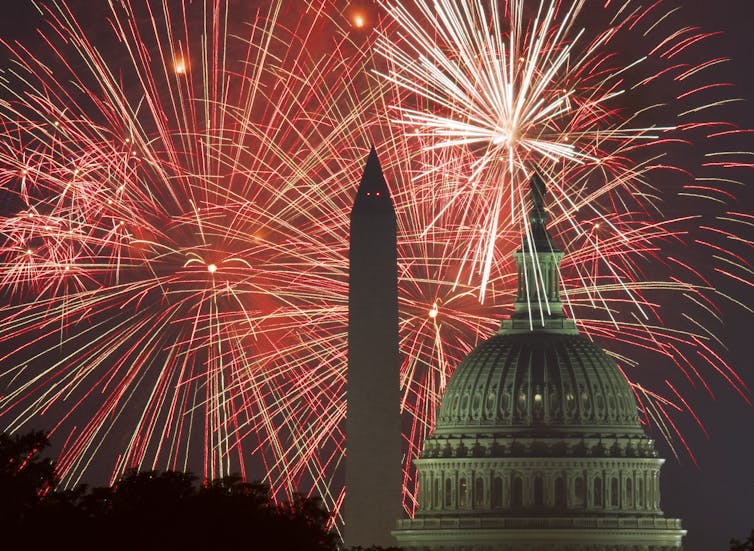Fireworks sales have fallen back to Earth after years of explosive growth – here’s why
- Written by Jay L. Zagorsky, Associate Professor of Markets, Public Policy and Law, Boston University

It’s almost the Fourth of July – a day of parades, barbecue and, of course, fireworks. But while parades and barbecues are still very popular, shockingly, this year fireworks are less so.
Imports of fireworks reached a peak in 2022 of almost US$600 million, according to the U.S. International Trade Commission[1]. But today, just two years later, my estimate is that fireworks imports will only reach about $350 million in 2024. What happened to one of U.S.’s favorite Fourth of July activities?
The answer, I believe, lies in the COVID-19 pandemic, which transformed the economy as billions of people around the world were stuck at home. E-commerce boomed[2], as did sales of alcohol[3], indoor exercise equipment[4] and cleaning products[5]. However, this boom was followed by a bust for many products[6], as people switched back to pre-pandemic buying habits.
This appears to be what happened with fireworks.
The explosive business of pyrotechnics
I am[7] a business school professor[8] who has followed the fireworks[9] industry[10] for years[11]. In the U.S., fireworks are a multibillion-dollar industry[12]. They’re primarily lit off around Independence Day and New Year’s Eve. To handle these two holidays, American businesses import large amounts of fireworks well in advance of these dates to ensure enough supply.
Fireworks were invented in China over 2,000 years ago[13], and most of the world’s fireworks are still made there today. Since 2010, China has exported almost 90% of the world’s fireworks, United Nations data shows[14]. Much of these are low-priced mass-market products. More expensive fireworks are exported from countries like the Netherlands, Germany, Spain, Poland and the U.S.
While Americans light off millions of pounds of pyrotechnics each year, only a small amount of professional fireworks are manufactured here[15]. Because so few fireworks are produced in the U.S., by using import and population figures, it’s easy to calculate how much explosives are blown up per person each year.
Back in 2010, about two-thirds of a pound of fireworks were lit off per person. In 2019, the year before the pandemic, the figure was three-quarters of a pound per person.
During the COVID-19 pandemic, when people were stuck in their homes and social distancing was common, fireworks use shot up. This makes sense: Setting off pyrotechnics is an outdoor activity where the product instructions explicitly state people igniting them should stand far away[16] from others. In 2021 and 2022, fireworks usage almost doubled to 1.35 pounds per American.
While 2024 isn’t over yet, most of what will be blown up this Fourth of July has already been imported. Extrapolating from the amount imported so far, 2024 fireworks consumption looks set to end up back at 2010 levels of about two-thirds of a pound per person.
Why the big drop?
I believe there are three reasons for the big decline. First, as already mentioned, there was the COVID-19 spike as bored people stuck at home looked for something exciting to do outside.
Second, relatedly, during the pandemic many people lit fireworks because public displays were canceled. The amount of display fireworks[17], which are shot off only by professionals, plummeted. Today, all of the public displays are back[18], which reduces demand from more casual consumers. Why worry about lighting dangerous explosives when a professional can take care of it?
The last reason is that, like so much else, fireworks are more expensive these days. Inflation in the U.S. has soared recently[19], with the prices of all kinds of goods and services rising. Fireworks are no different.
In 2021, the average import price for fireworks was $1.13 per pound, figures from the U.S. International Trade Commission show[20]. That cheap price wasn’t available to the typical buyer – it’s the wholesale price paid for an entire tractor-trailer container, just off the ship.
During the first four months of 2024, the bulk price jumped up to $1.61 per pound. This 42% price increase is more than twice the overall increase in the U.S. inflation rate[21].
Add in rising labor costs[22] at fireworks stands, and these three explanations make it clear why fireworks use is down since the pandemic’s peak.
Fireworks are a key part of the Fourth of July holiday, and they are often magnificent spectacles. However, if you’re shooting them off, use some common sense, especially if children are around. Each year, thousands of people in the U.S.[24] are injured and a small number die due to fireworks. So be careful.
And whether you’re lighting fireworks, watching them or just hiding from the noise[25], I wish you all a happy Independence Day.
References
- ^ according to the U.S. International Trade Commission (dataweb.usitc.gov)
- ^ E-commerce boomed (www.census.gov)
- ^ sales of alcohol (doi.org)
- ^ indoor exercise equipment (www.cnn.com)
- ^ cleaning products (www.jpmorgan.com)
- ^ a bust for many products (www.wsj.com)
- ^ I am (www.bu.edu)
- ^ business school professor (www.bu.edu)
- ^ fireworks (theconversation.com)
- ^ industry (theconversation.com)
- ^ years (theconversation.com)
- ^ multibillion-dollar industry (www.americanpyro.com)
- ^ invented in China over 2,000 years ago (www.americanpyro.com)
- ^ United Nations data shows (comtrade.un.org)
- ^ only a small amount of professional fireworks are manufactured here (www.americanpyro.com)
- ^ people igniting them should stand far away (www.safewise.com)
- ^ The amount of display fireworks (www.americanpyro.com)
- ^ public displays are back (www.rd.com)
- ^ Inflation in the U.S. has soared recently (www.cnn.com)
- ^ figures from the U.S. International Trade Commission show (usitc.gov)
- ^ overall increase in the U.S. inflation rate (www.bls.gov)
- ^ rising labor costs (www.reuters.com)
- ^ Paul J. Richards/AFP/Getty Images (www.gettyimages.com)
- ^ thousands of people in the U.S. (www.cpsc.gov)
- ^ hiding from the noise (www.nytimes.com)







